#cultural bridge
Explore tagged Tumblr posts
Text
53 notes
·
View notes
Text
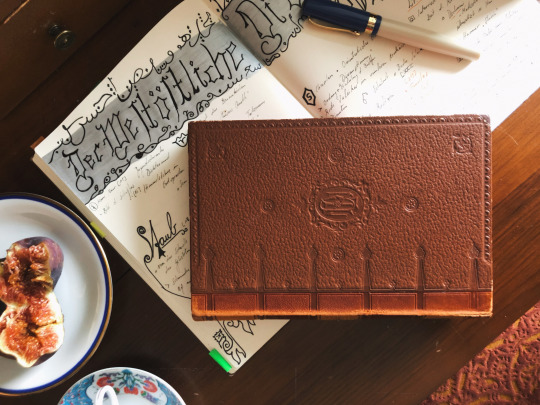

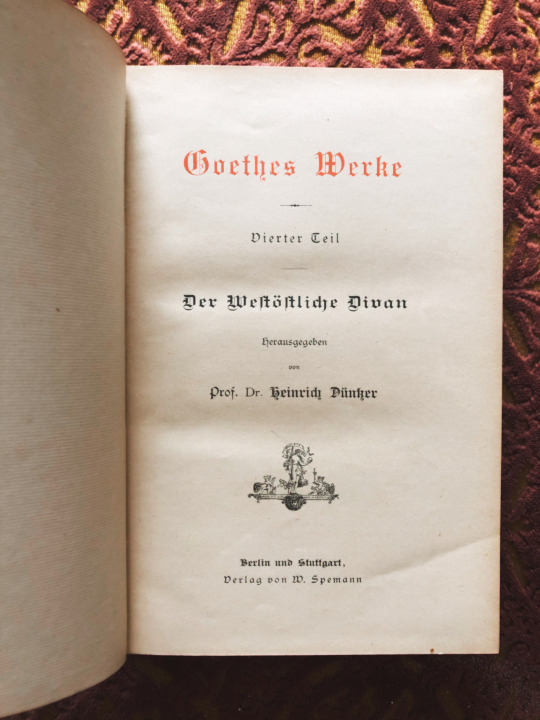
The "West-Eastern Diwan" by Goethe - A bridged beauty between Occident and Orient. Published by Prof. Dr. Heinrich Düntzer, Berlin and Stuttgart, 1878.
It is said, that Goethe used the "oriental mask" to cover his pantheistic ideas, speaking trough the lips of the newly translated poets. Next to the Hafez' poems, which where published and translated by the orientalist Joseph von Hammer, other literal and scientific sources were used as inspirational impact and to refine the tone of the great masters of Oriental poetry, like the academic achievements of Prof. Wurm, Prof. Paulus (Orientalist in Heidelberg), other translations of cultural impact like Rückert's "Östliche Rosen" (~ Eeastern Roses) the Mewlana-Transaltions of 1819 and the collection of August von Platen called "Ghaselen", Goethe corresponded with Boisserés and with one of the Grimm brothers. Wilhelm von Humboldt praised the authencitiy of Goethe's work.
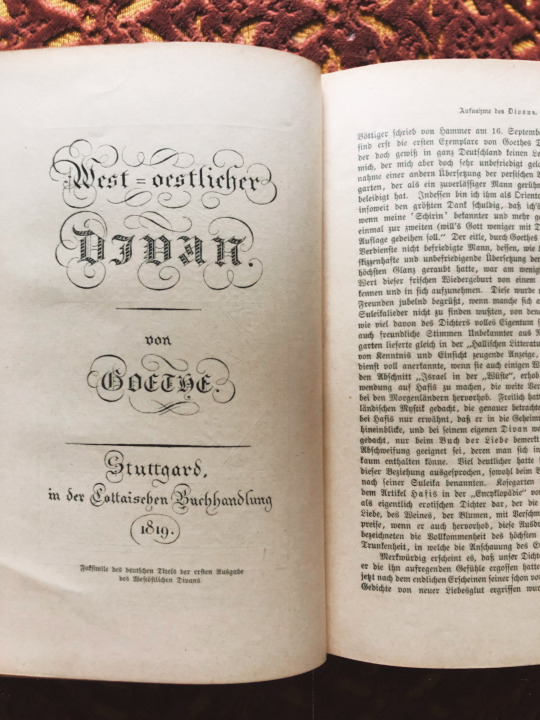

The "East-Western Diwan" is the last great cycle of poetry Goethe has wrote, his interest for Persian poetry arised in the time of the Rheinbund. It can be traced, that this period of time disillusioned him, the diving into another time and continent is essential for escapism, but as Goethe and his field of interest and curiosity is as deep as wide, he must felt like thrown like a freed bird into new heavenly realms. The "Diwan Atmosphere" was created by reading several works and taking in Oriental elements. So we can find "Madschnun and Leila" interwoven in the heart-shaking correspondence between Suleika and Hatem in the "Book Suleika". Expressions of the Dervish Hafis of Shiraz can be found, Tarafas, Labid (Prophet Mohammad called him the poet, who said the most true words; Labid converted to Islam and wrote eologies, but it is said, that he stopped practicing ?), Zoheir, Saadi and Hafez. Saadi was also known as a sheik and was called "Poet-King" (or King-Poet, if you like :P) and if we would compare the structure of the poems, it is more likely, that Goethe imitated Saadi, rather than Hafez.
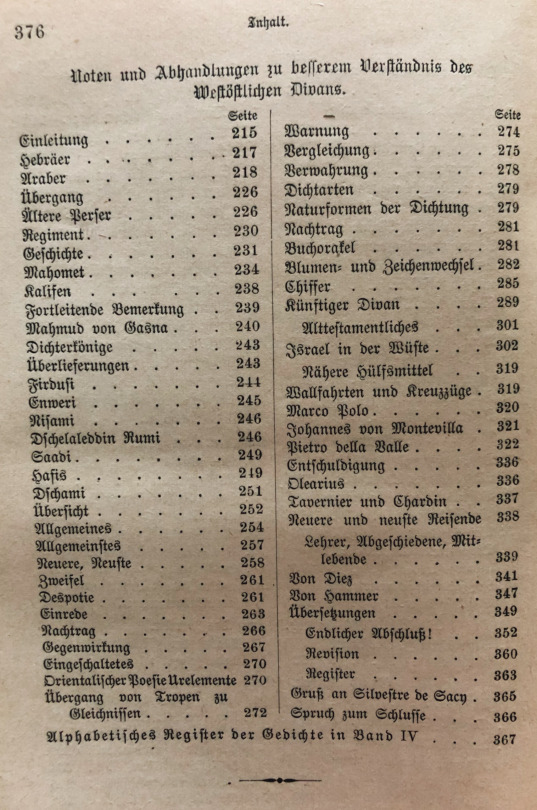
Goethe is playing wonderfully with expressions, merging wine and tears, praising the dust of the lover as better than safran and comparing the loved one to a drop of water and the lyrical-I as desert sand. Numerology is emphasising the cultural background, drawing a link between the poet and the priest, pairing mystics and religion into ecstatic relief. This wonderful work is a gift, for everyone, who sometimes had the feeling of getting ripped apart by two forces. It feels like the made-up gap between Europa and Asia is nothing but a fiction, like a forgotten song of our cultural cradle. Let us share the pomegranates of our culture, let us nourish from unkown fruits to break our borders, to sharpen our discernment, to truely lift our feet and recognize the extraordinary.

#antiquarian book#world literature#19th century literature#book#reading#Goethe#East-Western Diwan#Östwestlicher Divan#cultural bridge#Persian poetry#Arabian culture#Oriental#Orient#poetry#poets#German poet#Johann Wolfgang von Goethe#1878#old book#antiquarian
10 notes
·
View notes
Text










Huế, Vietnam. Credit to itscthinh (Instagram).
#vietnam#vietnamese#culture#history#sinosphere#fashion#historical fashion#aodai#ao dai vietnam#travel destinations#ancient architecture#traditional architecture#asian architecture#architecture photography#architecture#colonial architecture#fishermen#fisherman#lanterns#rivers#boats#bridge#drone#drone photography#landscape#landscape photography#landscape photoshoot#landscape photoset#beautiful photos#beautiful places
527 notes
·
View notes
Text
Another thing I find really refreshing and cool about Descendants(specifically the first one) is that there is no third act betrayal/misunderstanding/blow up between the main characters.
The VKs are all loyal to each other to the end, even once their motives have all changed and theyre no longer happy with the plan they stick together and follow Mal's lead.
Ben realizes hes been love potioned and finds it endearing and goes along with it even when the affects have worn off
Like the first descendants movie is practically allergic to the third act betrayal/misunderstanding despite CONSTANTLY setting up for one
#descendants#like coulda easily gone with a plotline about the VKs betraying Mal#or Mal betraying them#there coulda been consequences to spelling Ben but hes a freak and into that shit#the rest og the kingdom/students never even had the chance to be betrayed cuz everyone went in being suspicious of the VKs#and they didnt necessarily learn to NOT be suspicious but instead came to understand they were people too#highkey wish there was less about mal and ben's romance and more about friendship#and bridging the cultural gaps between the isle kids and the mainland#as well as the realization that the VKs are victims in all of this#like i just wanted more of that#less Mal and Ben romance#we had more VK stuff in the other movies at least
306 notes
·
View notes
Text
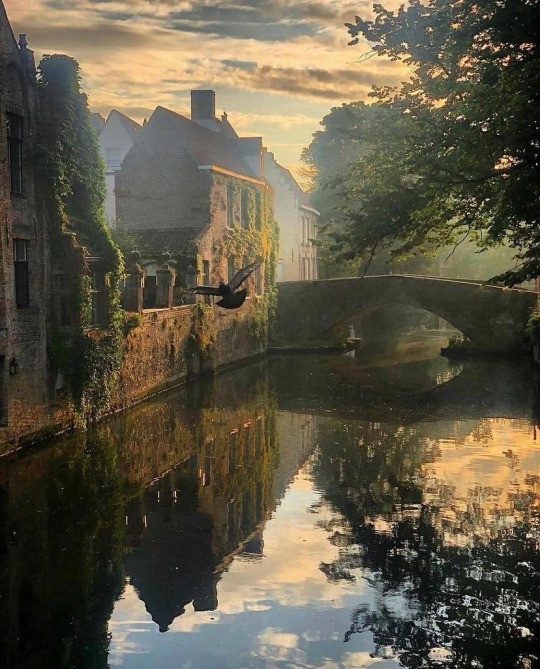
Brujas
1K notes
·
View notes
Text
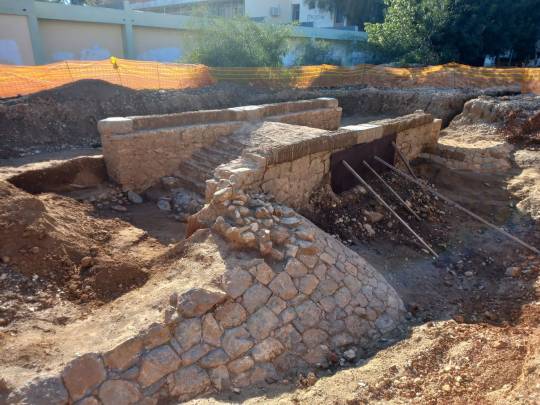
Ancient Roman Bridge Discovered at Elefsina, Greece
A Roman-era bridge was recently discovered in the ancient city of Elefsina, west of Athens during works for a suburban railway line.
The bridge was discovered by archaeologist Katerina Daskalopoulou and her team at a depth of just one meter below the surface close to the center of the modern city.
The team is currently examining the site to determine when the bridge was built and how it survived almost intact for over two thousand years.
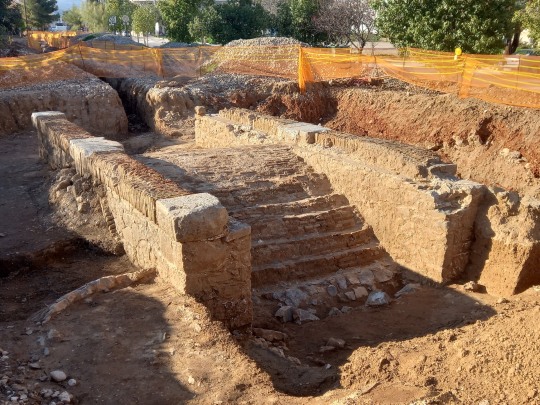
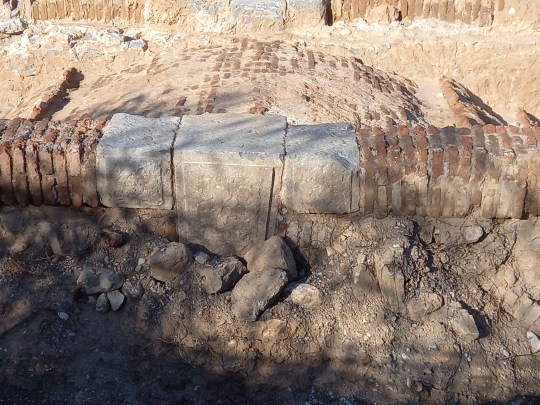
Roman Emperors and ancient Elefsina
The ancient city of Elefsina, also known as Eleusis in ancient times, is a city in Greece with a rich history dating back thousands of years. It’s most famous for the Eleusinian Mysteries, ancient rituals and ceremonies dedicated to Demeter and Persephone, which were among the most important religious events in ancient Greece.
The city itself was strategically located on the fertile plain of Thriasian, about 18 kilometers northwest of Athens. In addition to its religious significance, Eleusis was an important center for trade and politics in ancient Greece. It played a role in various conflicts and alliances throughout its history, particularly during the Persian Wars and the Peloponnesian War.
The Eleusinian Mysteries, however, remain its most enduring legacy. These rituals were celebrated annually, and participation was believed to bring spiritual benefits and a hopeful afterlife. The secrecy surrounding the Mysteries has left much of their details shrouded in mystery to this day.
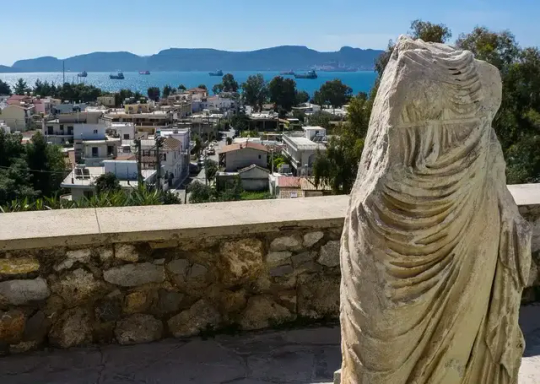
During Roman times, the city continued to be an important religious center, particularly for the Eleusinian Mysteries, which were embraced and supported by Roman emperors. The Romans, known for integrating Greek religious and cultural practices into their own, not only preserved but also enhanced the significance of the Eleusinian cult.
Several Roman emperors were initiated into the Eleusinian Mysteries, including Hadrian, Marcus Aurelius, and Julian the Apostate. Their support helped maintain the sanctuary’s prestige even as Rome dominated Greece. Hadrian, in particular, was a great admirer of Greek culture and contributed to Eleusis with construction projects.
Under Marcus Aurelius (161–180 AD), Eleusis saw significant renovations, including the construction of the Roman Triumphal Arch at the entrance to the sanctuary.
The Greater Propylaea, an impressive Roman-style gateway modeled after the Acropolis Propylaea, was built. The Telesterion, the main hall where the sacred rites were performed, was further developed.
In 2023 the ancient Greek city celebrated its ancient past by being nominated the Culture Capital of Europe.
By Tasos Kokkinidis.
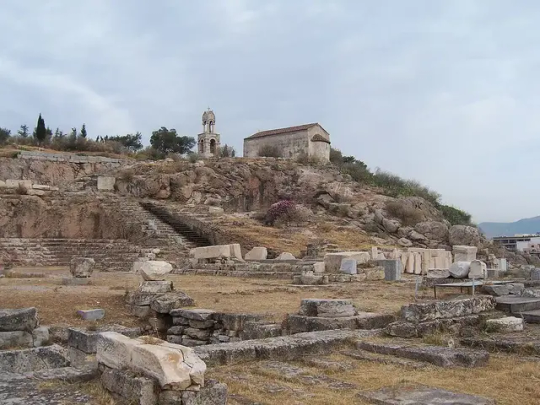
#Ancient Roman Bridge Discovered at Elefsina Greece#ancient city of Elefsin#Eleusinian Mysteries#ancient artifacts#archeology#ancient culture#history#history news#ancient history#ancient civilizations#ancient greece#greek history#roman emperor#roman history#roman empire
87 notes
·
View notes
Text

Ophelia
Artist: John William Waterhouse (British, 1849-1917)
Date: 1910
Medium: Oil paint on canvas
Collection: Private Collection
#literary art#ophelia#english literature#pre raphaelite brotherhood#romanticism#garden#tree#female figure#wildflowers#costume#bridge#human figures#william shakespeare#hamlet play#oil painting#painting#artwork#fine art#oil on canvas#british art#british culture#john william waterhouse#pre raphalite movement#british painter#european art#20th century painting
102 notes
·
View notes
Text
Saint Calvin told me not to worry about you
Mob and Ritsu - Saint Bernard (Youtube)
I was so inspired by this that I blacked out and taught myself some basic video editing just so I could further indulge in my brainworms about fictional siblings. enjoy!
#mp100#mob psycho 100#amv#video#shigeo kageyama#ritsu kageyama#kageyama shigeo#kageyama ritsu#this is my manifesto#trading duties back and forth of caretaking & protecting & lying & mourning the distance & bridging the gap at the cost of your own safety#i just think. Them#revive amv culture for me personally#my edit
257 notes
·
View notes
Text

Poplar in Mitchell County, North Carolina before and after hurricane Helene.
#mitchell county#appalachian#hurricane helene#western north carolina#wnc#western north carolina#appalachian mountains#north carolina#appalachian culture#appalachia#the south#nc mountains#railroad bridge#railroad tracks#railroad
96 notes
·
View notes
Text

New England Scenery
Artist: Thomas Cole (American, born England, 1801–1848)
Date: 1839
Medium: Oil on canvas
Collection: Art Institute of Chicago, Chicago, IL, United States
Description
Although Thomas Cole is best known for his scenes of the American wilderness, he also rendered pastoral vistas of cultivated landscapes. This work depicts New Hampshire’s White Mountains, an area that Cole traveled to and painted on numerous occasions, as did other 19th-century landscape artists. The prominent church spire at middle distance emphasizes the role of religion in agrarian society and the glow of the low sun expresses a sense of optimism for a rural America. The painting conveys an ideal that was increasingly far from reality, however, as the United States was then being transformed by rapid urbanization and the Industrial Revolution.
#painting#landscape#oil on canvas#fine art#american wilderness#rural landscape#new hampshire#white mountains#church spire#rural america#river#bridge#mountains#trees#foliage#grey horizon#artwork#oil painting#american culture#american art#thomas cole#american painter#19th century painting#art institute of chicago
39 notes
·
View notes
Text
No one touches me I'm just so utterly emotional about the fact that Quackity invited Cellbit to his passion project and now Cellbit invited Quackity to HIS passion project.
Like holy shit, a few months ago none of those people knew each other and look at them now making fucking international travels to meet and support each other
#i hope Quackity understand exactly how big what he did with qsmp is#like#this is INSANE#the way he truly helped people build bridges and share their projects and culture and make friends#there is no fucking way any of those people would ever talk to each other otherwise#and now#now even FIT is coming to brasil#im so normal about this
425 notes
·
View notes
Text
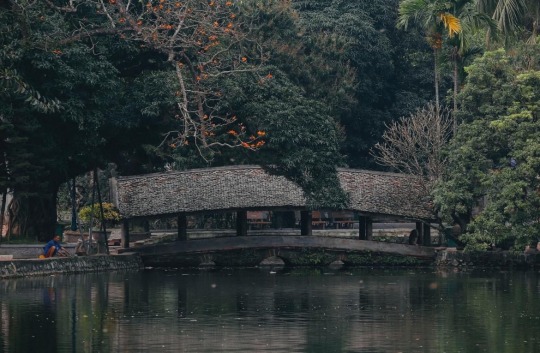
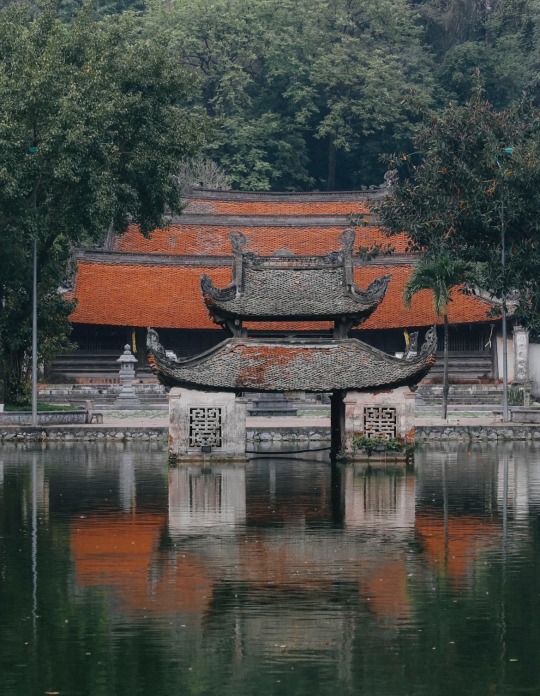
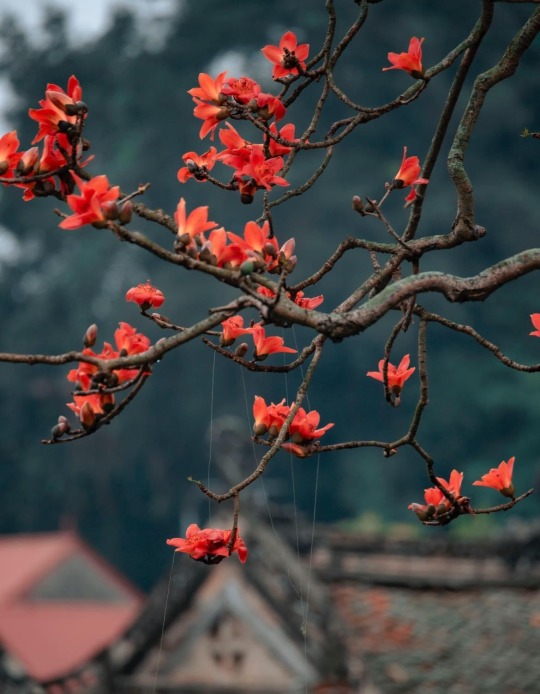

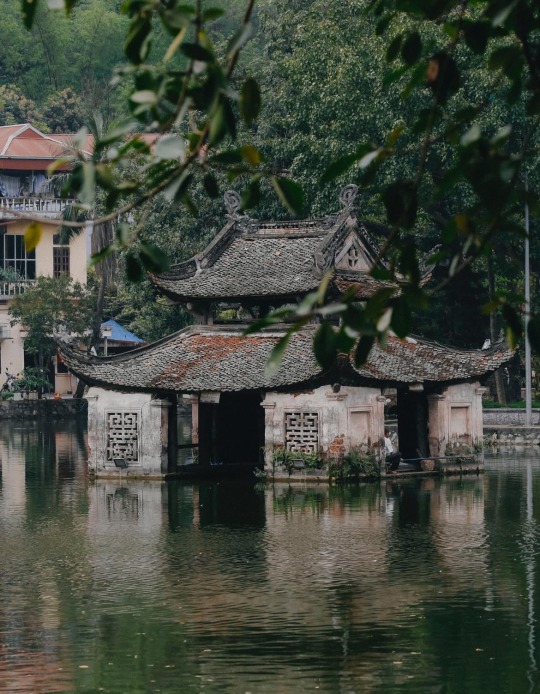
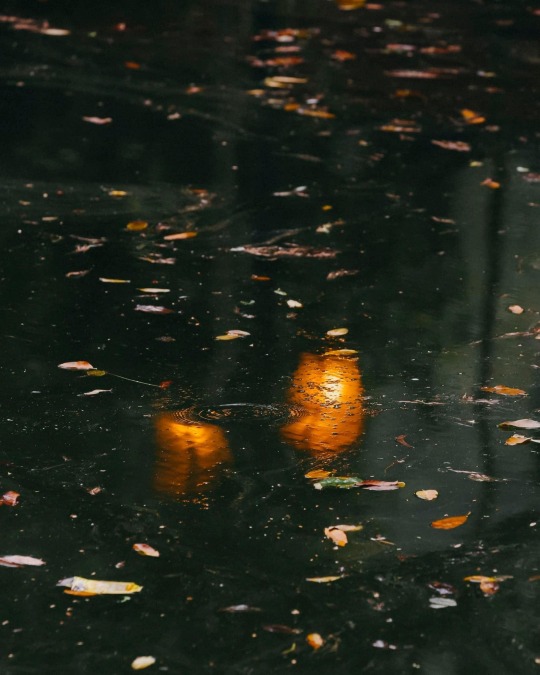
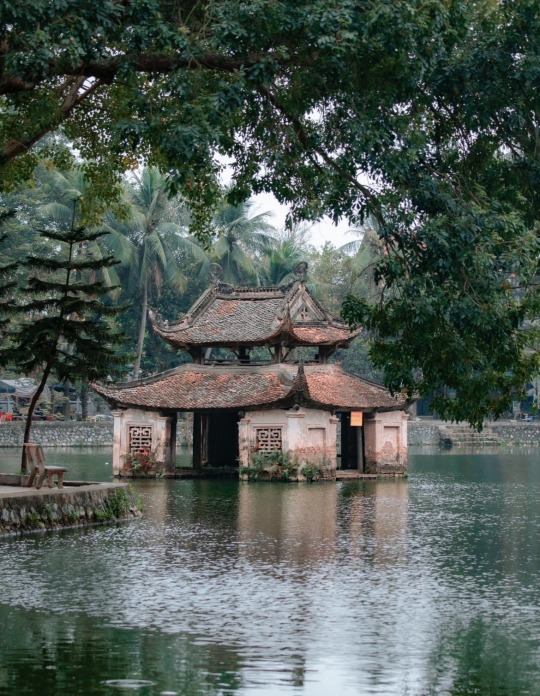
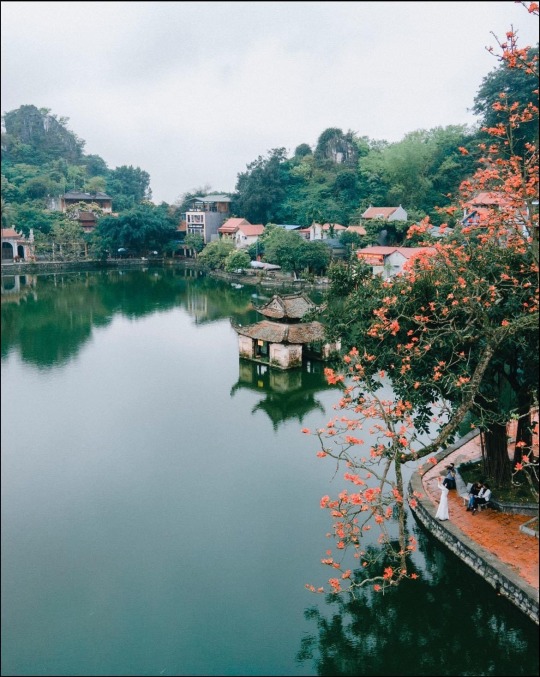
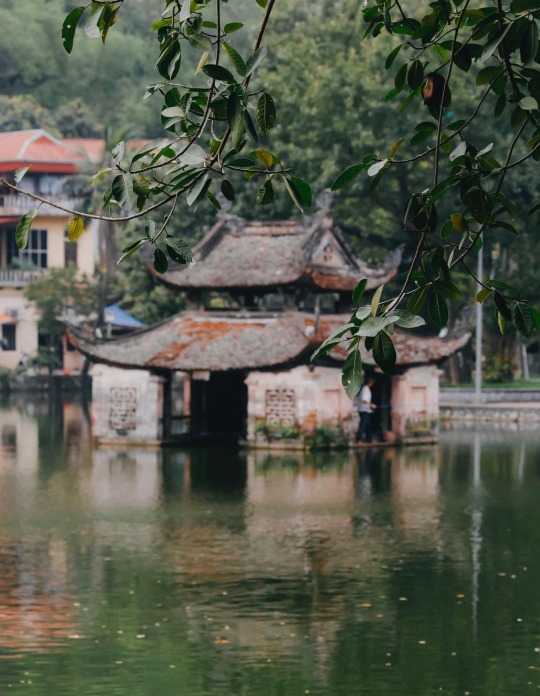
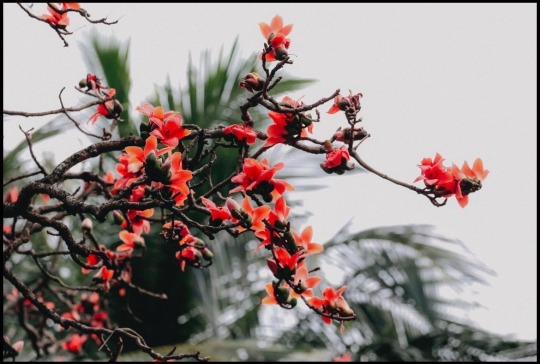
Thầy Pagoda, Hanoi. Credit to Blog của Rọt.
#vietnam#vietnamese#culture#history#sinosphere#travel destinations#hanoi#pagoda#traditional architecture#asian architecture#architecture photography#architecture#red flowers#spring flowers#flowers#bridge
188 notes
·
View notes
Text









Ming Covered Bridge in Old Lishui
This Ming Dynasty covered Huguan Bridge (護關橋), located not far from our ancestral home in Lishui (麗水), is representative of all facilities of its kind. Like most contemporary buildings, this structure has metamorphosed and evolved over the centuries.
Roofed bridges are a typically Chinese architectural phenomenon. Despite their reduced romanticism compared to open ones, covered bridges are exceptionally durable and much more human-friendly.) The preservation of the wooden structure is impressive, given the dampness from the river and the usual Zhejiang weather mood. The very name of Lishui is roughly “Beautiful Water”, it's everywhere.
A curious feature of Chinese bridges is that they often include a tiny shrine. In this case, it is a home-like altar dedicated to Guan Yu.
Photo: ©张霂佑tago
#ancient china#chinese culture#chinese history#qing dynasty#ming dynasty#chinese architecture#old china#chinese customs#chinese folk religion#guan yu#scenic#landscape#scenery#countryside#wooden architecture#wooden buildings#bridge#covered bridge
100 notes
·
View notes
Text
watching the finale of under the bridge and god. cam's confrontation of her dad over the adoption papers is heartbreaking. not just the realization that her whole life, her birth family was a short distance away - but her final statement. "but maybe i was meant to be something different."
god that cuts me so deep.
for those interested in reading more, AIM (adopt indian metis) was a real organization and took part in what's called the sixties scoop in canada, which was a mass effort to remove indigenous children from their families and be placed with white adoptive parents, effectively severing the ties of the children to their culture. cam's statement really gets at the heart of the way this robbed those children of any agency in their identity, any choice of it.
i suppose this is my soapbox moment as a canadian to say that canadian history is fucked and rife with racism. since the start, it has been an unceasing effort to eradicate the indigenous peoples from this land. there are those who have experienced this first hand in residential schools and forced adoptions. i am not one of them, but even the barest part of it that i, as a white canadian, can comprehend makes me genuinely sick to my stomach.
we talk constantly about raising awareness about the cultural (and literal) genocide of indigenous people in canada, but we get so detatched from it, viewing it as so far from current day. i hope that if anything, cam's storyline goes to show that it's not far from us - residential schools persisted into the 1980s and indigenous children are still removed from their communities at a disproportionate rate by social services.
there's no eloquent end to this post except to say that cam's story is one of so, so many here in canada.
#canada#reena virk#under the bridge#victoria bc#90s#mmiw#residential schools#cultural genocide#cam bentland
127 notes
·
View notes
Text







Art Museum in Jishou, China - Atelier FCJZ
https://www.fcjz.com/
#Atelier FCJZ#architecture#design#building#modern architecture#interiors#minimal#concrete#modern#old and new#bridge#museum#museum design#cool buildings#cool architecture#design blog#amazing places#city#urban#river#water#cultural#tradition#exhibition#galleries#light#concrete architecture#brutalist#china#chinese architecture
89 notes
·
View notes